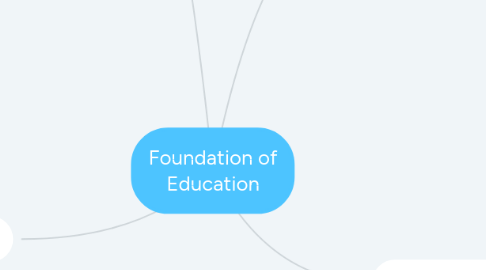
1. Sociology of Education
1.1. Theoretical Perspectives
1.1.1. An overall picture created by human beings and interpreted by them.
1.1.2. Best conceptual guide to understanding relation between the school and society because it gives one the intellectual scaffolding from which to hang empirical findings.
1.1.3. There are three major theories functional,conflict, and interactional.
1.2. Effects of Schooling on individuals
1.2.1. Employment
1.2.1.1. If individuals get an college and professional degree he or she may assume they are going to be getting a high pay, but women are more likely to get paid less than men and have a harder time finding a job due to family commitments.
1.2.2. Knowledge and Attitudes
1.2.2.1. When social class is considered into education, higher class background is found to produce higher achievements.
1.2.3. Education and Mobility
1.2.3.1. Poor and Rich education may have little to do with mobility. Private schools are thought of being a "mobility escalator" due to it representing a more prestigious educational route.
2. Philosophy of Education
2.1. Generic notions
2.1.1. Aristole believed that only through studying the material world was it possible for an individual to clarify or develop ideas.
2.1.2. Plato believed the world of matter was shadowy and unreliable.
2.2. Key researchers
2.2.1. The important Key researchers consistedof Plato, St. Augustine, Aristole's, Rene Descartes, Alfred North Whitehead and Bertrand Russell, Thomas Aquinas, Francis Bacon, and John Locke.
2.3. Goal of education
2.3.1. Teachers need to participate in the basic academic disciplines in order to transmit his or her students to the knowledge that is necessary for the human race.
2.3.2. Contemporary Realist
2.4. Role of teacher
2.4.1. Progressive setting is when the teacher nolonger has authority over anything. The teacher then turns into a facilitator.
2.4.2. Teachers have the responsibility to use different ideas with his or her students so they can travel to the new levels of awareness that can be used daily throughout life.
2.5. Method of instruction
2.5.1. Realists support a number of different teaching techniques. Mostly he or she would lecture, question and answer
2.6. Curriculum
2.6.1. Realists believe in the basics such as:science, math, reading, and writing
2.6.2. Idealists like the idea of great literature that are from the past. He or she also believed the past was easier and better to understand
3. Politics of Education
3.1. Conservative
3.1.1. Believes a free Market economic system is the most productive.
3.1.2. Believes the duty to solve ones problems lies on the individual not the government
3.1.3. Hold more traditional everyday values, largely protestant christian; anti abortion, same sex marriage, etc.
3.2. Progressive
3.2.1. School is the central of problem solving including social interactions.
3.2.2. That school is a milestone to prepare students for upcoming life changes.
3.2.3. Students use their creativity by "thinking out of the box"
4. History of Education
4.1. The Rise of the Common School
4.1.1. The Colonial Era
4.1.1.1. This Era started by individuals who brought in new ideas.
4.1.1.2. Wealthy settlers stated in the united states in order to receive a better education at the high education schools.
4.1.1.2.1. Harvard, Yale, Princeton and Columbia are examples of the high education schools.
4.1.1.3. Ten of the schools well educated students would be chosen to attend the college of William and Mary.
4.1.2. Urbanization and the Progressive Impetus
4.1.2.1. Large amount of immigrants came to the United States from Northwest Europe.
4.1.2.2. This was a problematic time for americans due it being the First Industrial Revolution.
4.1.2.3. John Dewey was an important philosopher during this time, but it is said that his influence on schooling is still with us.
4.1.2.3.1. Dewey was a contemporary and participated in the Progressive movement.
